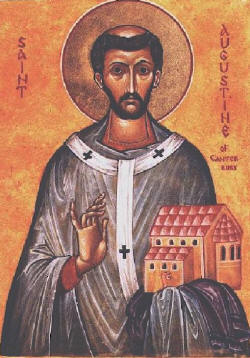All Resources in this section
How to download Resources in our site
Click here for more information on how to download our resources.
Lives of Saints
St Augustine of Canterbury (1020-1085)
Feast day: 27th May
Early in life I became a monk in the famous monastery of St. Andrew’s, erected by St. Gregory. In the year 596, I was asked to lead a party of about 40 monks from Rome to evangelize the Anglo-Saxons in England. I had hardly reached Gaul (France) when I heard stories of the ferocity of the Anglo-Saxons, and of the treacherous waters of the English Channel.
So, I returned to Rome and to the Pope who had sent us, and having been assured by Pope, St Gregory the Great, that our fears were groundless, we set out again and this time we crossed the channel and landed in the territory of Kent ruled by King Ethelbert, a pagan married to a Christian. Ethelbert received us kindly, gave us permission to evangelize and set up a residence for us in Canterbury and within the year, on Pentecost Sunday 597, was himself baptized. After being consecrated a bishop in France, I returned to Canterbury. I constructed a church and monastery on the site where the present cathedral (begun in 1070) now stands. As the faith spread, additional sees were established at London and Rochester.
Work was sometimes slow and I did not always meet with success. The Anglo-Saxon Christians and the original Briton Christians were often in conflict. My attempts to reconcile them failed. I also failed to convince the Britons to give up certain Celtic customs at variance with Rome to forget their bitterness towards their Anglo-Saxon conquerors. During this time I tried to labour patiently, and to heed Pope Gregory the Great’s missionary principles. The Pope encouraged us to purify rather than destroy pagan temples and customs; to let pagan sites and festivals to be taken over into Christian feasts; to retain local customs as far as possible. I achieved limited success during the eight years till my death, in 605, but my efforts eventually bore fruit. As a result, I am often known as an “apostle of England.”
“Let others choose to themselves portions among creatures, for my part, You are my portion.”
St Augustine of Canterbury
Download a pdf format file of this biography by clicking here: St Augustine of Canterbury
We welcome your help, comments and suggestions regarding these and other resources on this website. They will be used as a guide for improvements and future developments. Please write to us by sending an email on info@sdc.me.uk.


Follow us on